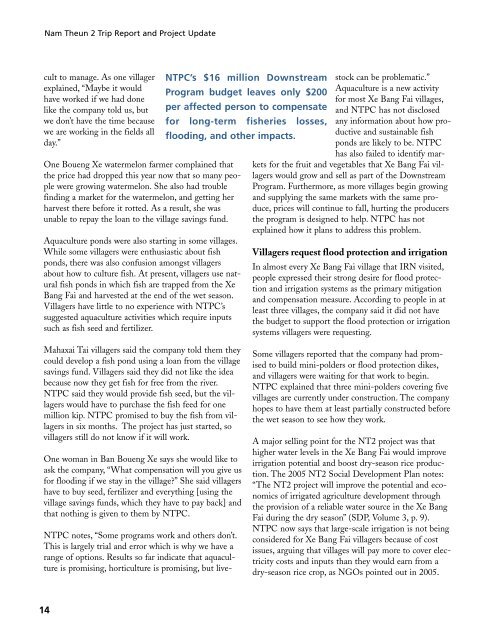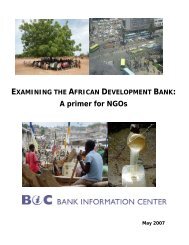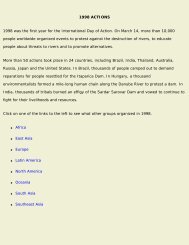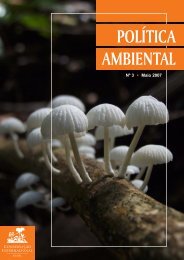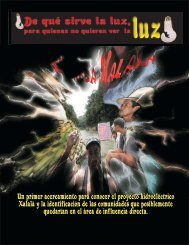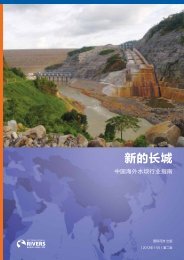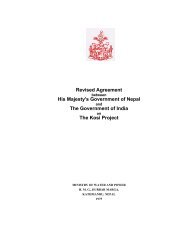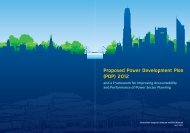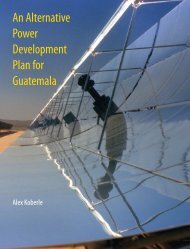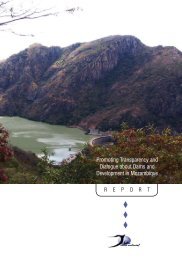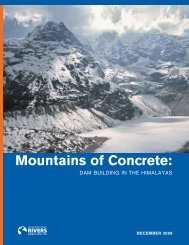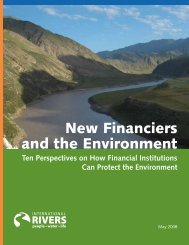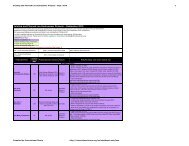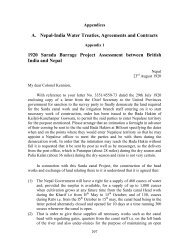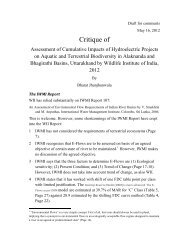Nam Theun 2 Trip Report and Project Update - BankTrack
Nam Theun 2 Trip Report and Project Update - BankTrack
Nam Theun 2 Trip Report and Project Update - BankTrack
Create successful ePaper yourself
Turn your PDF publications into a flip-book with our unique Google optimized e-Paper software.
<strong>Nam</strong> <strong>Theun</strong> 2 <strong>Trip</strong> <strong>Report</strong> <strong>and</strong> <strong>Project</strong> <strong>Update</strong>cult to manage. As one villagerexplained, “Maybe it wouldhave worked if we had donelike the company told us, butwe don’t have the time becausewe are working in the fields allday.”One Boueng Xe watermelon farmer complained thatthe price had dropped this year now that so many peoplewere growing watermelon. She also had troublefinding a market for the watermelon, <strong>and</strong> getting herharvest there before it rotted. As a result, she wasunable to repay the loan to the village savings fund.Aquaculture ponds were also starting in some villages.While some villagers were enthusiastic about fishponds, there was also confusion amongst villagersabout how to culture fish. At present, villagers use naturalfish ponds in which fish are trapped from the XeBang Fai <strong>and</strong> harvested at the end of the wet season.Villagers have little to no experience with NTPC’ssuggested aquaculture activities which require inputssuch as fish seed <strong>and</strong> fertilizer.NTPC’s $16 million DownstreamProgram budget leaves only $200per affected person to compensatefor long-term fisheries losses,flooding, <strong>and</strong> other impacts.NTPC notes, “Some programs work <strong>and</strong> others don’t.This is largely trial <strong>and</strong> error which is why we have arange of options. Results so far indicate that aquacultureis promising, horticulture is promising, but livestockcan be problematic.”Aquaculture is a new activityfor most Xe Bang Fai villages,<strong>and</strong> NTPC has not disclosedany information about how productive<strong>and</strong> sustainable fishponds are likely to be. NTPChas also failed to identify marketsfor the fruit <strong>and</strong> vegetables that Xe Bang Fai villagerswould grow <strong>and</strong> sell as part of the DownstreamProgram. Furthermore, as more villages begin growing<strong>and</strong> supplying the same markets with the same produce,prices will continue to fall, hurting the producersthe program is designed to help. NTPC has notexplained how it plans to address this problem.Villagers request flood protection <strong>and</strong> irrigationIn almost every Xe Bang Fai village that IRN visited,people expressed their strong desire for flood protection<strong>and</strong> irrigation systems as the primary mitigation<strong>and</strong> compensation measure. According to people in atleast three villages, the company said it did not havethe budget to support the flood protection or irrigationsystems villagers were requesting.Mahaxai Tai villagers said the company told them theycould develop a fish pond using a loan from the villagesavings fund. Villagers said they did not like the ideabecause now they get fish for free from the river.NTPC said they would provide fish seed, but the villagerswould have to purchase the fish feed for onemillion kip. NTPC promised to buy the fish from villagersin six months. The project has just started, sovillagers still do not know if it will work.One woman in Ban Boueng Xe says she would like toask the company, “What compensation will you give usfor flooding if we stay in the village?” She said villagershave to buy seed, fertilizer <strong>and</strong> everything [using thevillage savings funds, which they have to pay back] <strong>and</strong>that nothing is given to them by NTPC.Some villagers reported that the company had promisedto build mini-polders or flood protection dikes,<strong>and</strong> villagers were waiting for that work to begin.NTPC explained that three mini-polders covering fivevillages are currently under construction. The companyhopes to have them at least partially constructed beforethe wet season to see how they work.A major selling point for the NT2 project was thathigher water levels in the Xe Bang Fai would improveirrigation potential <strong>and</strong> boost dry-season rice production.The 2005 NT2 Social Development Plan notes:“The NT2 project will improve the potential <strong>and</strong> economicsof irrigated agriculture development throughthe provision of a reliable water source in the Xe BangFai during the dry season” (SDP, Volume 3, p. 9).NTPC now says that large-scale irrigation is not beingconsidered for Xe Bang Fai villagers because of costissues, arguing that villages will pay more to cover electricitycosts <strong>and</strong> inputs than they would earn from adry-season rice crop, as NGOs pointed out in 2005.14


